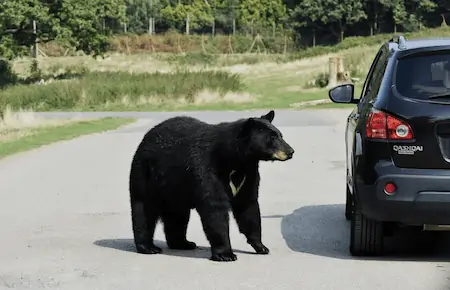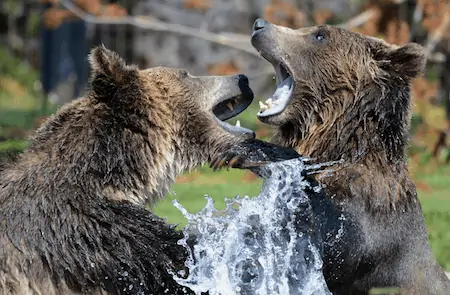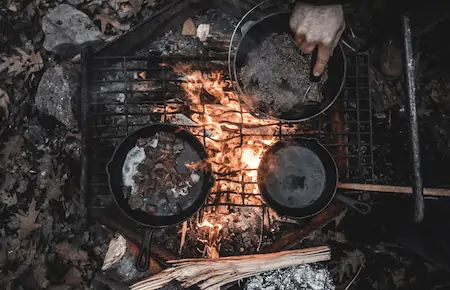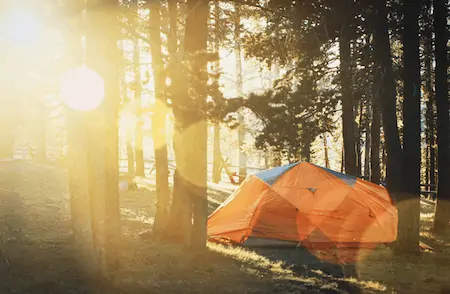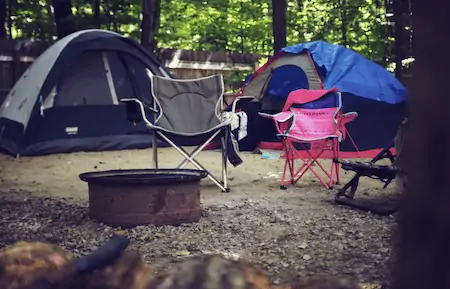One of the most common fears hikers usually carry out with themselves while camping is sudden encounters with bears!
Though bear attacks are pretty rare, most people have this scary feeling of falling into the danger of being the unlucky one!
This makes a lot of people ask this question, how to make a tent bear proof?
Bear proofing the campsite is a prerequisite when you are going to hike and stay in a bear-prone area.
There are several effective ways to bear-proof your tent and in this article, we will talk about those practical steps in detail for your convenience.
Stay tuned!
How Common Are Bear Attacks?
Before we go into the details of bear proofing a tent, let’s talk about how common or rare bear attacks are in the first place.
Actually, bear attacks are not that common the way people think of them. This is pretty much obvious that bear attacks are fatal and tragic but chances are very low that you will be attacked by one.
Even if you go statistically, you will see that bear attacks are pretty less in number compared to the number of people who keep visiting bear-prone areas every year.
From a 2019 study that got published on Nature, it is stated that there are almost 183 attacks by Grizzly bears in North America from 2000 to 2015.
However, not all bear attacks lead the victim to death, though some of them do. There was another study in 2011 that concluded that only 63 people died due to bear attacks from 1900 to 2009 in Canada and the USA combined.
So, you can easily assume how rare these accidents happen and extreme cases are also very few in numbers.
You need to understand one thing that bears are not aggressive animals until and unless they are too hungry or you annoy them for no reason.
They usually don’t attack humans but things can go differently if they are starving and find you with a food smell.
Bears have a great sense of smell which makes your task a bit harder.
Should You Be Scared Of Bear Attacks In Your Tent?
In general, bears don’t have that much interest to roam around you without any proper reason.
But yes, they might come closer to your tent if they can smell something tasty enough coming from inside.
Brown and black bears usually roam around places in search of food and accidentally they may discover your tent if the food smell attracts them.
So the primary concern here is, if you are storing some food items or scented materials into your tent, then it increases the chances of bear attacks.
This is an obvious fact that the less you store such smelly items, the fewer bears will be attracted to your tent. To be very specific, you won’t naturally find any bear outside of your tent saying hello to you all of a sudden.
If you follow bear safety rules and strategies, you don’t need to bother much about getting attacked by a bear outside of your tent.
Can A Tent Save You from A Bear?
A regular tent is not enough to protect you if things go wrong, unfortunately.
In most cases, regular tents are made of polyester or nylon fabrics which are usually thin enough to survive any harsh attack.
But, tents made of reinforced steel are such special ones that can provide you protective support against wild animals.
So if you are going to hike to a bear-prone country, then it would be a wise decision to take tents made of this special material.
Even if you don’t bring tents of reinforced steel, you don’t have to bother much. As bear attacks are rare, if you focus on other essential protective measures, then that would be enough for you.
Things That Attract Bears
To ensure the proper safety of your tent and overall campsite, you have to know about the things that usually attract bears.
This will help you to take necessary precautions as required being aware of the fact that bears will come closer to you when you don’t hide these elements far from your tent.
So what are those elements that bears generally get attracted to? The most common things are given below:
- All kinds of human foods
- Garbage
- Pet food
- Utensils and cooking pots
- Stove and lantern fuels
- Cooking oils
- Canned beverages
- Bird seeds
- Toothpaste, cosmetics, lotions, and insect repellents
When you are camping in a bear-prone area, make sure you store all these bear attractants far from your tent in a way that bears don’t feel like coming closer to you.
Yes, you might need to use some of those necessary items, but once you are done using them, leave them to where they belong, into your storing place.
How to Bear Proof a Tent?
Once you possess a balanced understanding of bear attacks, it will be much easier for you to take the necessary initiative to bear-proof your tent without getting worried.
Now, what are the effective ways to do it? Let’s talk about those protective measures one by one:
#1. Select the Right Campsite
The initial approach to save your campsite and tent from bears would be selecting the right campsite in the very first place.
To choose the right campsite, get to know the recent bear activities in that particular campsite. If you find a place full of recent accidents, then it’s better to look for some alternative options.
Before you fix your campsite, make sure your place is far away from natural food sources such as berries and grains. If you follow hanging foods on tree protective measures, then your site also needs to have enough trees for this very purpose.
Overall, you better get some pre-ideas about your campsite from the owner or maintainer of that particular campground about this necessary information before you step up to set up your camp.
This will help you to deal with any unwanted situations with ease as you will be prepared the right way.
#2. Set Up Your Camp Properly
Once you select the campsite, the very next step would be setting up the camp the right way. So, how to set up a camp with proper safety?
Well, in a general scenario when you set up your camp, the kitchen tends to be pitched closer to your tent. But, if you are doing it in a bear country, then that would not be a wise decision.
You have to pitch the tent at least 60m or 200ft away from your cooking spot to play it safe. 200ft distance means, there will be almost 70-80 adult steps difference between your tent and kitchen area.
On the other hand, you should also maintain a similar distance between your kitchen and water source to make the whole set up perfect.
So, once you set up your tent 70 steps away from your kitchen and 70 paces away from the nearest water source that will minimize the chances of bear attacks to a great extent.
As the smell of your food might attract the bears to come closer to your cooking spot, but due to the distance in between, they wouldn’t bother to come closer to your tent.
#3. Apply Effective Methods To Store Food
The most important concern about making a tent bear-proof is to apply effective methods to store food.
When bears are hungry and they roam around places for food, your dinner leftovers may attract them to come closer to your campsite. But, human foods are not ideal diets for bears, as they can’t provide the necessary nutrition they need.
On the other hand, if bears get habituated to human foods, they eventually get dependent on humans as well.
This will increase the chances of bears roaming around campsites and tents to attack hikers and campers. So, knowing how to store food while camping is a crucial knowledge you must have if you are visiting bear country places.
Before you choose any form of food storage system, first get to know whether there are available options for that or not in your campsite.
Some places have some strict maintenance that won’t allow you to apply some food storing procedures even if you think those would be more effective.
So, it’s your responsibility to know about the given restrictions of your camping area if there any. Breaking any of the rules of that particular camping land can cause serious consequences from the authority if things go wrong.
But still, you need to learn about all the effective approaches to store your food, so that you don’t have to bother in any circumstances.
So, what are the most effective methods to store food?
Let’s talk about them one by one.
-
Bear Lockers
Bear lockers are especially available in national forests and national parks where the authority wants you to use these lockers to protect your food from bears.
These steel-built lockers are strong enough to store foods that bears can’t get any access to.
In fact, if you find such lockers in your campsite, then it means you have to use them and this is the general rule.
Many landowners and national park or forest authorities set up bear lockers for the safety of the visitors. It allows you to store food safely and enjoy a good sleep without worrying about bears at night.
So, if your campsite allows you to store food in these lockers, then it initially gets easier for you; you don’t have to look for other self-initiated methods.
-
Bear Canister
Using a bear canister is the most common approach to save food items from a bear’s reach. This is basically a hard material container-type product that has space inside to hold your food items.
In most cases, bear canisters are made of hard plastic along with lids which are specially made not to be broken by bear’s attacks.
Bears will try their luck anyway to open the lid and get your foods but most probably, they won’t be able to do so due to their build quality.
So, as a protective measure, you can use bear canisters in your campsite to save your tent from bear attacks.
-
Hanging Bags
If bear canisters are not available, a good alternative would be using bear hang to protect your foods from hungry bears.
Compared to bear canisters and bear lockers, these hanging bags are lightweight, cheap alternatives with good support. You just need a few carabiners, rope, and food bags to make this thing work.
You can hang up all kinds of foods, pans, pots, cups, utensils, bowls, and even garbage through this hanging bag process.
When it comes to Grizzly Bear’s territory, you better hang up all these necessary items for your safety purpose. These bags should be placed at least 12 to 15 feet higher from the ground.
Moreover, you should also ensure that your hanging bags are at least 8ft away from the trunk of that particular tree.
Because if you don’t maintain such distance from the ground and from the trunk, then bears will be able to reach your food items and other important hiking and cooking materials.
Though this approach to hang food bags on trees is not as effective as other methods are, still these bags might work well when the tree line is not too uneven compared to the ground.
Where there are uneven land and tree lines and they keep fluctuating, you won’t be able to save your food items effectively over there.
-
Bear Proof Coolers
This food safety option is quite new in the world of camping and it is getting popular day by day.
Campsites that are specially designed to provide a good service to the campers are occupying bear-proof coolers in their system.
Compared to other available options, this one requires special maintenance support and even costs more.
IGBC (International Grizzly Bear Committee) is the authority here that does the testing of these coolers to provide professional support.
Though this system of food safety is not allowed in every campsite yet, you better check the rules and regulations of your campsite before you even start the trip.
If you want to get the best out of these coolers, then you have to use padlocks to lock the coolers to prevent your foods from being stolen by bears around the campground.
#4. Bring Separate Pairs of Clothing
When you make food for your lunch or dinner on the campground, it is pretty much obvious that your clothes get smelly with food dirt, and flavor.
If you go to bed with those clothes on or if you keep those clothes in your tent, then there’s a big chance that bears will misjudge the smell and pop up around your tent in search of food.
So, your cooking or eating clothes should be entirely different from your sleeping dresses and you should put your eating time dresses into bear canisters or bear hangers for safety.
This might sound like being extra cautious, but if you want to maintain proper safety procedures, then that’s what you need to do anyway.
#5. Keep Your Campsite Clean
As an ethical camper, you can’t leave your campsite messy and full of wastage of your used products and food leftovers.
You must keep it clean and leave it as it was when you arrived. And, this is more recommended when you are camping in a bear country.
What if you don’t keep it clean? Will bears get attracted to dirty campsites?
Well, this is pretty much conceivable that when you don’t keep your campsite clean, it will surely welcome surrounding bears to visit you in search of food.
As bears are pretty much sensitive to smell, any kind of wastage or dumping would easily attract them to come closer to your tent.
Keeping the campsite clean helps you in a way that bears don’t really find any acute smell to get attracted to come closer.
So, keep it clean and play it safe.
#6. Keep Bear Deterrent Spray
Even if you take all the necessary precautions to avoid bears popping up around your tent, you can be unlucky, and bears may visit you.
So, what if they knock you at your tent’s doorstep? Well, still there is an escape to avoid bear encounters and that is using a bear deterrent spray.
There are multiple deterrent options available on the market from which you can pick up your desired one.
Not every deterrent spray works the same way in terms of effects but most of them are quite effective. So, keep your bear deterrent spray with you in your tent to survive any unwanted emergency situation with bears.
When you prepare for sleep, keep your spray with you into your tent. If you hear some bear sound at night coming out of your tent, then depending on the danger level, spray your deterrent until the bear gets scared and irritated to leave the place.
Once you spray the deterrent, it can also affect your eyes and skin, as the chemical gets access to come into contact. So, it is recommended that you use cold water to wash your skin and eyes for at least 10 to 15 minutes, once the danger is gone.
Not only sprays but also there are multiple natural and artificial ways to deal with bears when they find you as a victim of their attack.
Most of those bear deterrents are made of an acute smell that helps to repel bears. Whether you use spray or other forms of bear deterrents, for example, bear whistle, make sure you don’t hurt these wild animals aimlessly.
Don’t forget, you are not the actual inhabitant of the forests, bears are.
So, if you want to visit their domain, you have to be careful enough to deal with certain situations like this one wisely.
#7. Some Significant Tips to Follow
Other than the methods and procedures mentioned above, there are a few more significant tips to follow, if you want to avoid bear attacks while camping.
- Keep your flashlight open into the tent while you sleep. This works like a warning sign for bears to avoid unwanted dangers.
- Try to avoid foods that have special aromatic flavors such as bacon and fish.
- Do not bury garbage or food scraps. Rather pack them all and store them in the required place.
- Set up your tent far from bear signs, carcasses, berry patches, and trails.
- If a bear suddenly enters your tent, try to escape the place as soon as possible and find some safe area to survive. Report such incidents to the local authority if they occur.
What to do If You Encounter a Bear?
You may discover a bear all of a sudden while camping or hiking. And you may also find yourself alone without any deterrents as well.
So, what to do then?
Well, based on the intensity of the situation, you can try different approaches such as:
- When the bear is unaware of your presence, leave the place calmly as soon as possible.
- If you find the bear just in front of you, try to make it feel that you are not another animal or prey with your calm voice.
- If you find the bear running away after seeing you, you better run in the opposite direction.
- When it goes to extremes that the bear approaches to attack you, use anything that is close to you to fight against the bear and escape from it. We hope that you never face such a scenario even in dreams.
Final Words
Bears are not predatory animals like wolves, tigers, or lions. They are more calm and quiet and keep themselves busy in their own world in most cases.
But as you are interfering into their territory while camping, a sudden encounter is not something totally ignorable.
So, when you know how to make a tent bear proof, you play it safe from your side, and bears also don’t get bothered because of your presence in their world.
This article basically talked about each and every nook and crannies about this matter for your comprehensive idea about the matter, hope you find it useful enough.

